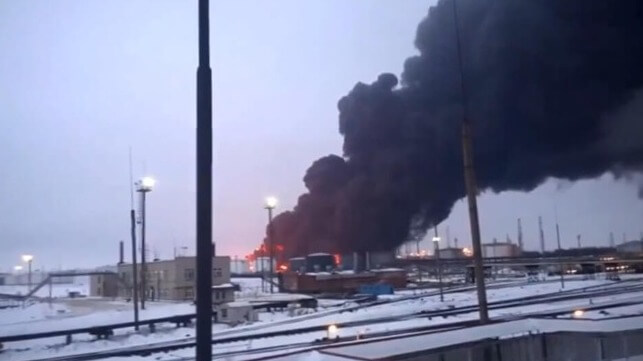Attacks on Refineries Force Russia to Ship More Crude and Less Products

Over the past few months, Ukraine has begun a concerted effort to attack Russia's oil refining sector with unmanned aerial drones, and it has had considerable success. These strikes have sparked explosions and fires at more than a dozen refinery complexes to date, including six in the last ten days alone. While energy analysts suggest that this will have a limited effect on the Kremlin's revenue and fuel supply, it does appear likely that it will affect the mix of Russia's energy exports.
The Russian government has acknowledged that the Ukrainian attacks are having an effect on domestic refining, and Russian energy minister Nikolai Shulginov reports that refinery throughput has decreased seven percent since the start of the year. However, the strikes are not expected to impact overall oil production. His ministry claims that the effect will be felt only as a change in the mix of exports. Refining runs will go down, but unrefined crude oil shipments will increase proportionally, deputy energy minister Pavel Sorokin told state media last week.
Another Russian oil refinery hit tonight, this time in Slavyansk-on-Kuban, Russia-occupied Circassia (the Russians call it Krasnodar region).
— Sergej Sumlenny, LL.M (@sumlenny) March 17, 2024
This is the 10th Russian refinery hit in 2024, and the 6th one within the last 10 days. Excellent! Sanctions work! pic.twitter.com/8G5WOK5l66
/1. This morning in Ryazan, Russia, three kamikaze drones attacked an oil refinery. pic.twitter.com/rftm9VUN1V
— Special Kherson Cat ???????????? (@bayraktar_1love) March 13, 2024

that matters most
Get the latest maritime news delivered to your inbox daily.
One early sign of this shift is the Russian ban on gasoline exports, implemented last month in order to conserve domestic stocks. While gasoline exports have been canceled, seaborne crude exports were up about 12 percent in February, according to CREA.
Russian producers export roughly $500 million worth of crude oil and refined products every day by seaborne shipment, according to the Center for Research on Energy and Clean Air (CREA). Turkey is the leading importer of Russian refined products, followed by China and Brazil, and half a dozen others buy smaller amounts. Only two nations buy Russian crude in quantity: India and China.
